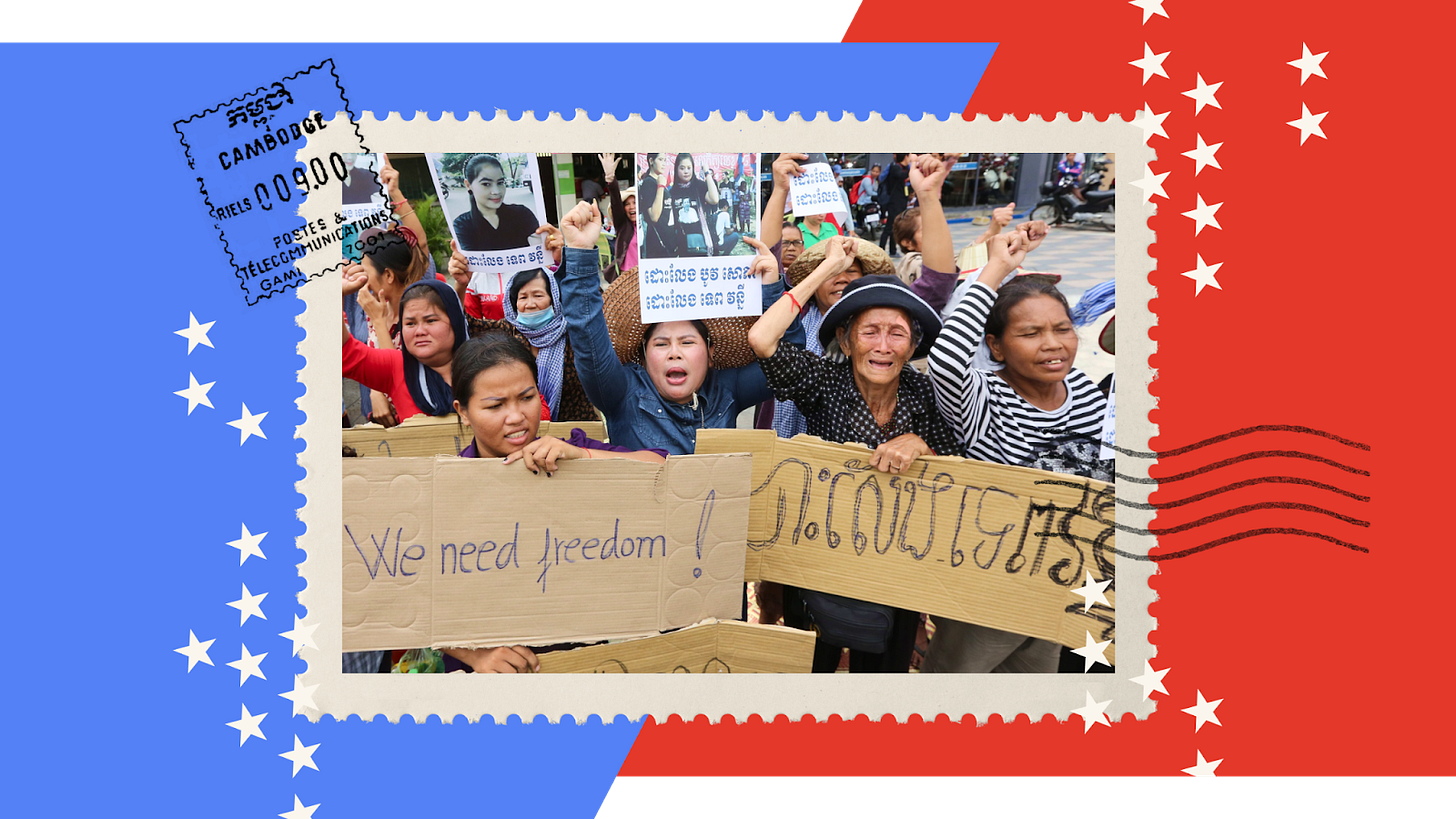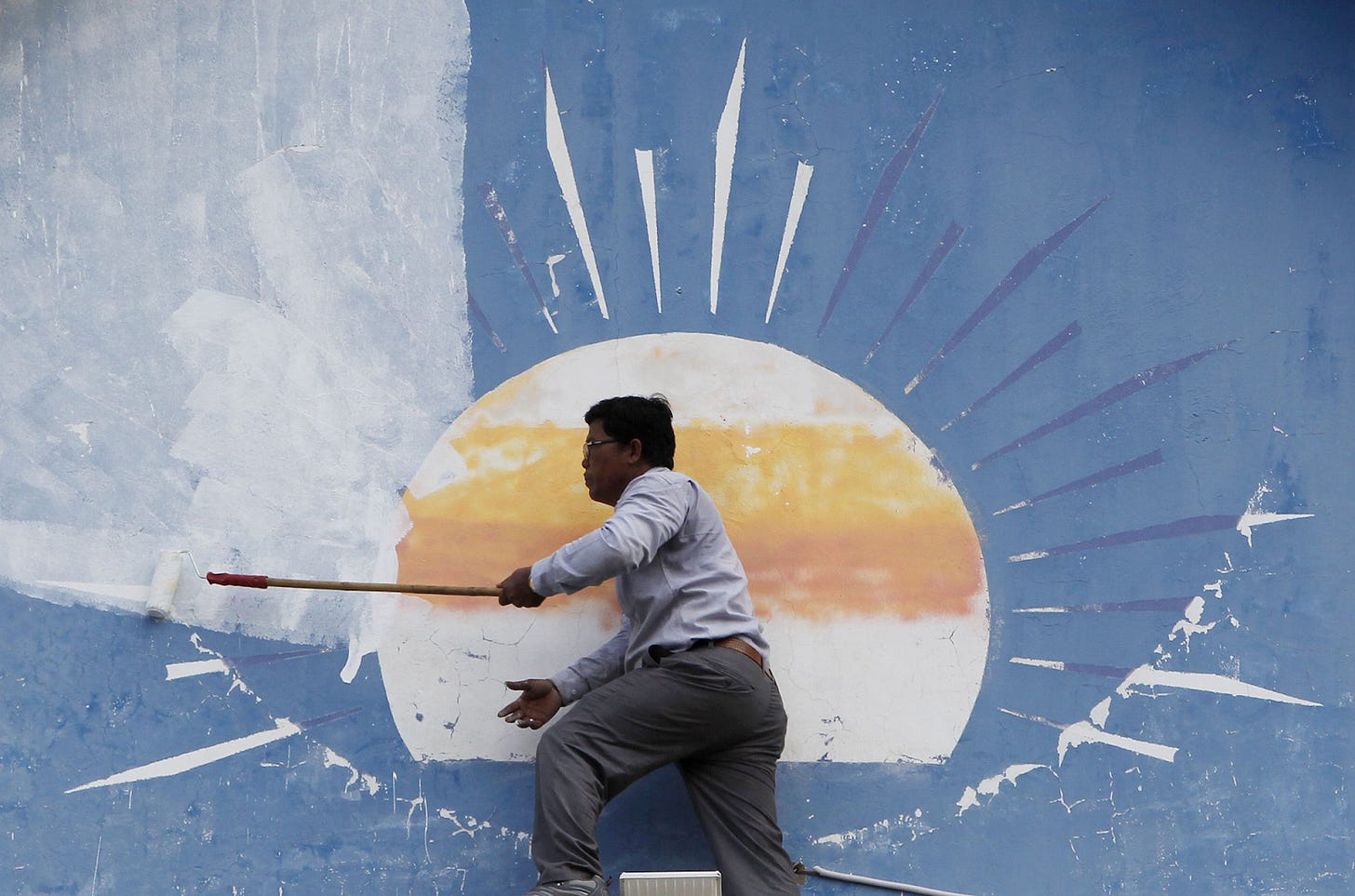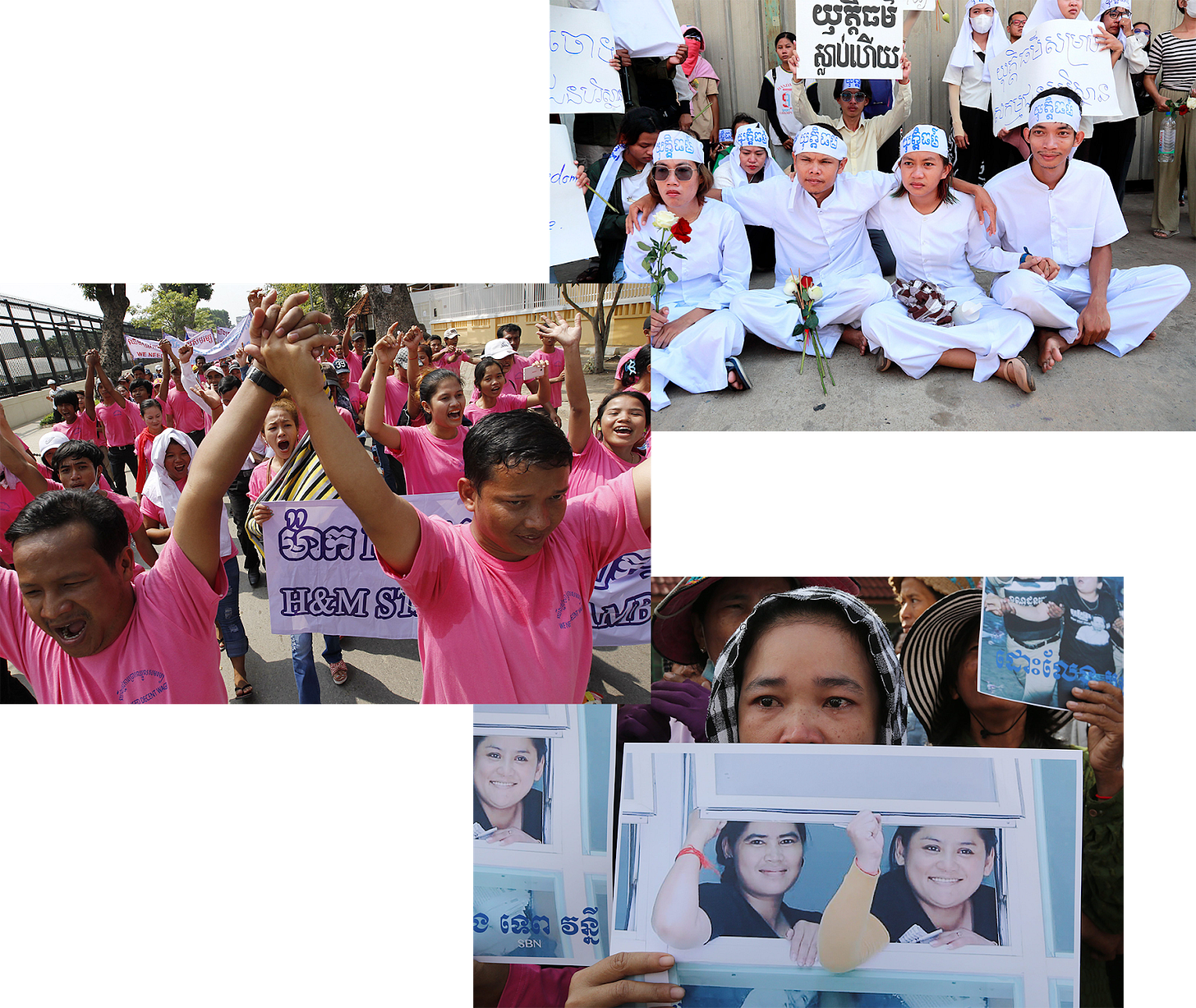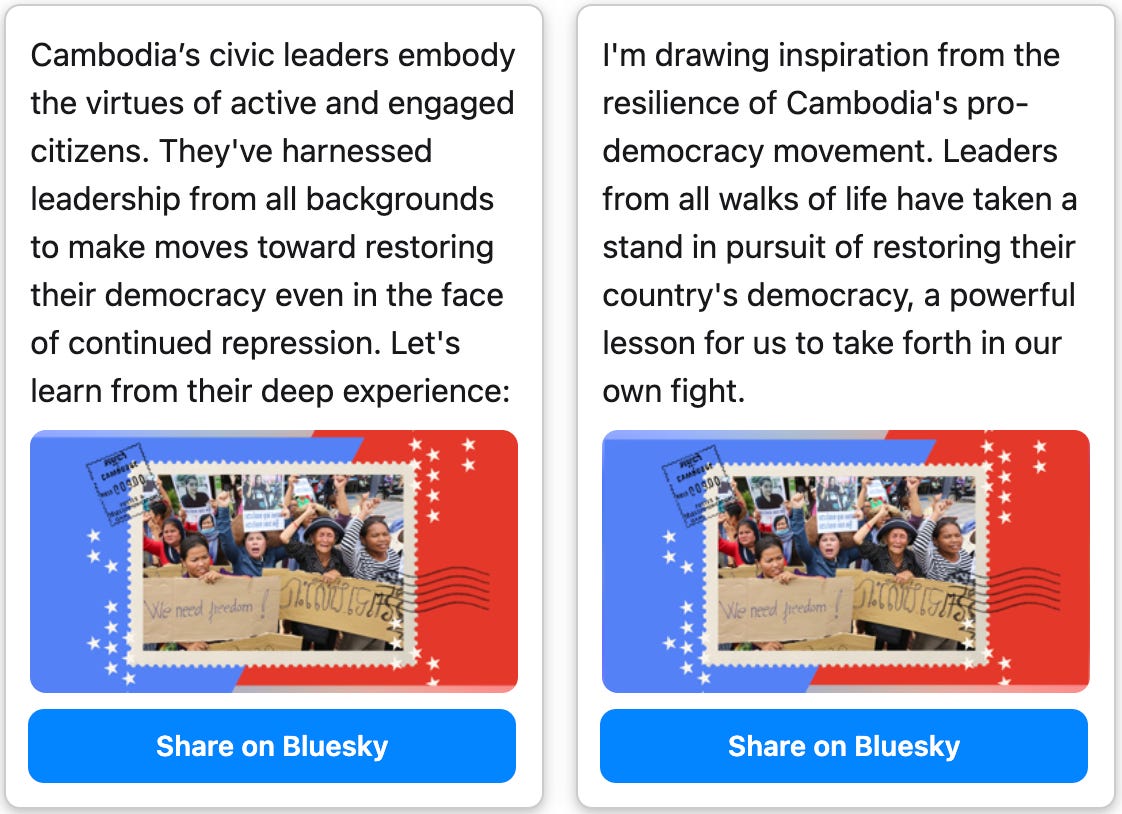Democracy Atlas rule 4: Leadership lives in everyone
Cambodia demonstrates the value of leaders from all backgrounds

Rule 4: Leadership lives in everyone: Unprecedented times open up opportunities for unexpected leaders. Leadership thrives under uncertainty because people must rely on their own instincts when they don’t have a trusted authority to turn to for guidance. Harness this power by creating space for civic groups, informal communities, students, and others to organize. Lean into the diversity of leadership that the United States has to offer.
The federal structure of the U.S. system makes election fraud and authoritarianism writ large harder to pull off because power does not fully lie in any one place. Focus on forming strong relationships with state and local leaders — like governors, state legislators, and mayors — and help grassroots movements connect with them. Because decentralized power threatens autocrats, they may try to target these leaders. Wherever possible, offer them resources and provide them with political cover so they can push back against pressure from the national level.
For those living under the cruelty of authoritarian rule, the promise of democracy offers hope for a fairer and more just future. But building democratic institutions, especially in the shadow of an entrenched leader or party, requires great resilience from those fighting for change. And in countries where speaking out against the government is met with threats of retribution or other repercussions, it’s often ordinary citizens who are most likely to become unexpected leaders in the struggle for democracy.
In Cambodia, courageous leaders from all walks of life — inside and outside of politics — have taken a stand in the pursuit of pluralism and individual liberties, even as they face enormous risks in doing so.
Following years of warfare and authoritarian rule, hopes of a democratic renewal spread across Cambodia in the wake of the 1991 Paris Peace Agreements, which ushered in a United Nations peacekeeping mission to hold free elections. While over four million Cambodians cast a ballot in the country’s inaugural 1993 general elections, the contest was marred by violence and intimidation perpetrated by the Cambodian People’s Party (CPP), led by then-Prime Minister Hun Sen.
Still, there was a sense of optimism that the elections would help bolster Cambodia’s transition to democracy. But the country’s fragile coalition government collapsed in 1997 after Hun Sen orchestrated a coup to oust his governing partner and sideline his political opponents. From that point forward, Hun Sen consolidated nearly total political power — and the CPP has been in charge ever since.
Although the CPP continues to hold elections, they haven’t been truly competitive since the early 2000s. And democracy isn’t just about whether elections are held. It’s about how they’re held — and whether there exists an open and robust civic space to protect the rule of law over the whims of a single leader or political force.
Since 2008, each subsequent election in Cambodia has taken place under increasingly repressive conditions. By 2018, Hun Sen had effectively established one-party rule in the hands of the CPP. And in 2023, the longtime ruler transferred power to his son, now-Prime Minister Hun Manet, underscoring the regime’s turn toward unabashed authoritarianism.
Today, opposing the CPP (or engaging in any kind of activism) carries real danger. The government uses repressive laws and state violence to deny basic rights and persecute political and civic leaders. And the legacy of the Khmer Rouge’s reign of terror, including a genocide that killed millions under totalitarian dictator Pol Pot, remains a powerful deterrent to civic engagement.
Fear, understandably, runs deep.
Authoritarians thrive when citizens remain passive in the face of repression, so every act of resistance and solidarity reminds others (and the world) that pro-democracy efforts are still possible. And despite the clear risks associated with taking action, some Cambodians have continued pushing back for a more open society.
Cambodia’s political opposition has tried to fight back, but faces increased repression from the authoritarian ruling party
Even in authoritarian contexts, opposition political parties and their leaders can sometimes use their platforms to help spark and sustain pro-democracy movements. When governments try to instill fear, brave political leaders have the opportunity to send a message that it’s still possible to stand up to the autocratic government.
In Cambodia, pro-democracy politicians have faced violence and other threats for speaking out against the CPP’s growing authoritarian impulses.
To prevent vote splitting ahead of the 2013 general elections, Cambodia’s two largest pro-democracy parties unified to form the Cambodia National Rescue Party (CNRP). The CNRP ran on restoring the rule of law and ensuring free and fair elections — in a direct contrast to the CPP’s tightening grip on power.
On election day, the CNRP made unprecedented gains while the ruling CPP received its lowest share of parliamentary seats in over a decade. The CNRP’s clear pro-democracy message, combined with its economy-focused policy platform, resonated with millions of Cambodians frustrated by the CPP’s entrenched rule.
Still, the ruling party claimed victory amid widespread allegations of irregularities at the polls. In the aftermath of the elections, opposition leader Sam Rainsy called for an independent review of the vote, and U.S. officials joined in condemning the CPP’s lack of transparency.
In the months that followed, anti-government demonstrations spread, fueled by anger over Cambodia's backsliding democracy and the stagnating economy under CPP rule. Rainsy, along with his fellow CNRP leader, Kem Sokha, joined thousands of protesters in decrying the country’s “facade of democracy” and demanding a clean election. Though the protests eventually fizzled after the government deployed violence against demonstrators, opposition leaders continued to speak out.
In the 2017 local commune elections (typically a bellwether for national contests), the CNRP once again made impressive gains in spite of the repressive environment for the political opposition. Across Cambodia, voters made it clear that they were ready for change.
But the ruling party — fearful of losing its hold on power — responded with new attacks on the opposition in the run-up to the 2018 general elections. Ahead of the vote, the CPP relied on the co-opted legal system to dismantle the CNRP. Authorities arrested opposition leader Kem Sokha, and the CPP-controlled Supreme Court later dissolved the CNRP altogether. The court’s decision marked “the end of true democracy in Cambodia” and sent a chilling message to anyone hoping to build an anti-authoritarian political movement.

With the CNRP officially out of the way, Hun Sen and his ruling party essentially ran unopposed in 2018.
And yet, the pro-democracy political opposition refused to disappear. After the CNRP’s dissolution, the Candlelight Party became Cambodia’s primary opposition party, bringing together former CNRP members and others fed up with the regime.
Again, the political opposition made some surprising gains in the 2022 local elections. Though the ruling party still finished ahead, the government responded to the resurgent opposition by barring the Candlelight Party from participating in the 2023 general elections — clearing the way for Hun Sen’s undemocratic transfer of power to his son, Hun Manet.
Even as Cambodia's pro-democracy politicians operated on an uneven electoral playing field, their continued efforts signaled to the public that some level of democratic resistance remained possible. And the government’s relentless attacks only emphasized its own insecurity. After all, if the ruling party was truly as popular as it claimed, why would it feel the need to destroy all forms of political opposition?
That’s the paradox confounding authoritarians around the globe: The more they tighten their grip to appear strong, the more they reveal just how weak (and afraid) they actually are.
Leadership isn’t confined to the political sphere — it can stem from anyone working to make a change
In Cambodia, unexpected leaders from a wide variety of backgrounds have stepped forward to fight for change.
Whether or not their efforts are directly related to politics, Cambodia’s civic leaders embody the virtues of active and engaged citizens — a hallmark of democracy that stands in contrast to the passivity encouraged (and often enforced) by authoritarian regimes.
Workers and union leaders have continued to play a role in public mobilization efforts. Garment workers were at the heart of anti-government demonstrations in Phnom Penh following the flawed 2013 elections, as they marched for higher wages and stood in solidarity with those protesting the ruling party’s electoral manipulation.
When Cambodia's largest casino laid off over 1,000 employees in 2021, a workers’ strike erupted amid charges of wrongful termination. Through active mobilization led by union leader, Chhim Sithar, the casino workers brought national attention to the firings — exemplifying the potential of courageous leadership in the face of continued repression. And following the government’s arrest of Chhim Sithar and her subsequent release from prison last year, the workers have continued to resist the state’s intimidation campaign.
Other civic leaders have emerged from environmental and land rights groups challenging the government’s corrupt development projects.
Mother Nature Cambodia (MNC), an award-winning youth-led environmental movement, has successfully halted environmentally ruinous construction while also drawing a link between its advocacy and the broader fight for Cambodian democracy. Over the past several years, MNC’s young leaders have remained “relentless” amid increased state repression — including a series of arbitrary arrests intended to “muzzle criticism of governmental policies.”

The government’s controversial land grabs (typically carried out to reward CPP cronies) have also spurred significant resistance. Tep Vanny, a homemaker-turned-activist, launched the Boeung Kak Lake movement to push back against the government’s corrupt takeover of a neighborhood near Phnom Penh. Highlighting the unexpected profile of the movement’s leaders, The Economist described the group as a “band of 13 women — a dowdy lot of impoverished middle-aged mothers, homemakers, and a grandmother,” who used nonviolent sit-ins and protest songs to fight the eviction of longtime residents.
Despite the government’s increased crackdowns — including bogus charges brought against Tep Vanny — the movement is credited with curbing the CPP’s overreaching land grabs over the past decade. The Boeung Kak Lake activists also brought greater scrutiny to the ruling party’s corruption, itself a byproduct of mounting authoritarianism.
Together, Cambodia’s civic leaders highlight the role of ordinary citizens in demonstrating acts of democratic resistance, no matter the scale or scope.
But even leaders outside the political realm pose a threat in the often-paranoid minds of autocrats, so it’s crucial that they receive protection and ample resources to remain resilient. To that end, Cambodian advocacy networks have stepped up their efforts to offer legal and technical support to activists and their organizations in the fight to preserve Cambodia’s ever-shrinking civic space.
After decades of the CPP’s authoritarian rule, everyday Cambodians have grown exhausted with their government. But pro-democracy leaders — both inside and outside of the traditional political arena — continue to advocate for a more open Cambodia. In recent years, members of Cambodia’s diaspora communities have played an increased role in advancing pro-democracy efforts, even as they face rising threats of transnational repression (another common tactic of insecure autocrats around the world).
Regardless of any immediate outcomes, each act of resistance makes a difference in the struggle against tyranny. In authoritarian systems where the government might seem all-powerful, even modest actions can forge the foundation for greater change. And eventually, small acts of courage by unexpected leaders may help create the conditions that build toward the restoration of Cambodia’s democracy.





Thank you for posting this article. I was in Cambodia in 1991 and 1993 on an assignment with Norwegian Save the Children called then as Redd Barna. Then I had met people who had survived the Khamer Rouge's atrocities and lost all their properties, first taken by them and then later robbed CPP's men. Even Sinhanuk's daughter had to pay a huge amount to reclaim her home. With this background, I am not surprised to read on what has happened and saw some of cambodia's trend when I visited it again 2016. Yes, the values of leaders from all background counts io fight against a new form of authoritiarinism, which is emerging as a coalition of both extremes Left and Right.
It's time we start the national organization.
It was just announced that AI is reading our conversations and making notes, then the bots come to interfere.
WELCOME TO THE PEOPLE'S STRIKE FOR DEMOCRACY!
A Peaceful, Legal, and Nationwide Call to Action
We are everyday Americans who are done watching corruption, greed, and authoritarianism hijack our democracy.
We are teachers, workers, veterans, retirees, nurses, farmers, students — united by one truth:
This government no longer works for the people.
It is now our duty to stop cooperating with a broken system. That’s why we are calling for a National Strike.
A National Strike means:
No work
No school
No shopping
No silence
We gather peacefully at our state capitols or local courthouses to make one thing clear:
We will not comply with the destruction of our rights, freedoms, or future.
Where & When?
This is a state-by-state movement.
The date is up to US!
When your community is ready, you rise.
Each state has its own call-to-action you can post, print, or share.
You’ll find them in our toolkit and graphics archive.
What We Stand For:
Protecting democracy and fair elections
Ending corporate and oligarchic rule
Defending civil rights and human dignity
Opposing tyranny — in all forms
What We Will Never Do:
Promote violence
Target people over parties
Break the law
Stay silent in the face of fascism
This is not about politics. This is about power.
And it belongs to the people — if we’re brave enough to take it back.
🇺🇸 We are the majority. We are awake. And we will be heard.
🔗 Share this. Print this. Show up. The strike begins when we say it does!
Below sample which I'm currently working on for every state.
I'm unable to do much this week, my old dog is having surgery.
PLEASE BECOME AN ORGANIZER IN YOUR STATE AND GET SOME VOLUNTEERS. IT'S NOW OR NEVER.
NATIONWIDE STRIKE URGENT REQUEST TO SAVE OUR DEMOCRACY
https://generalstrikeus.com
Read complete website and sign that you'll join.
* The Price of Freedom: A Nation's Stand
My fellow Americans,
We stand at a precipice. The very foundation of our democracy, the principles that define us as a nation – freedom, justice, and the power of the people – are under siege. A regime has taken root that seeks to dismantle these ideals, to centralize power, and to silence the voices of ordinary Americans.
This is not a drill. This is not a partisan debate. This is a battle for the soul of our nation, and we, the American people, are the last line of defense.
To reclaim our democracy, we must face an uncomfortable truth: we must halt the engine that fuels this regime. We must, together, choose to disrupt the very systems it relies upon. This means a collective act of non-cooperation. It means temporarily stopping the flow of productivity that empowers those who seek to undermine us. It means, for a time, accepting financial pain.
I understand the gravity of these words. I know the fear and uncertainty that such a prospect evokes. Families will struggle. Businesses will face hardship. But I ask you: what is the cost of losing our democracy? What is the price of living under a system where our rights are eroded, our voices are silenced, and our future is dictated by a few? That cost, my friends, is far greater and far more enduring than any temporary economic pain we might endure.
Think of those who came before us – who risked everything, who shed blood and treasure, to establish and preserve this nation. They endured famine, war, and unimaginable sacrifice for the promise of a free society. Are we, in this generation, less capable of defending that legacy?
This is not about surrender. This is about strategic withdrawal of our energy and resources from a system that has become weaponized against us. By stopping our collective productivity, we starve the regime of its power. We deny it the resources it needs to perpetuate its control. We create an undeniable crisis that forces a reckoning.
This will be painful. There is no sugarcoating it. But we are a resilient people. We are ingenious. We will organize. We will support each other through community, through shared resources, and through the unbreakable bonds of our common purpose. We must prepare for this pain, knowing that it is the necessary path to a greater good.
The choice before us is stark: a brief, intense period of shared hardship for the promise of a free future, or a slow, agonizing slide into authoritarianism with consequences that will echo for generations.
Let us rise to this challenge. Let us stand together, united in our resolve. Let us choose freedom, no matter the cost. Our democracy, our future, depends on it.
God bless America!